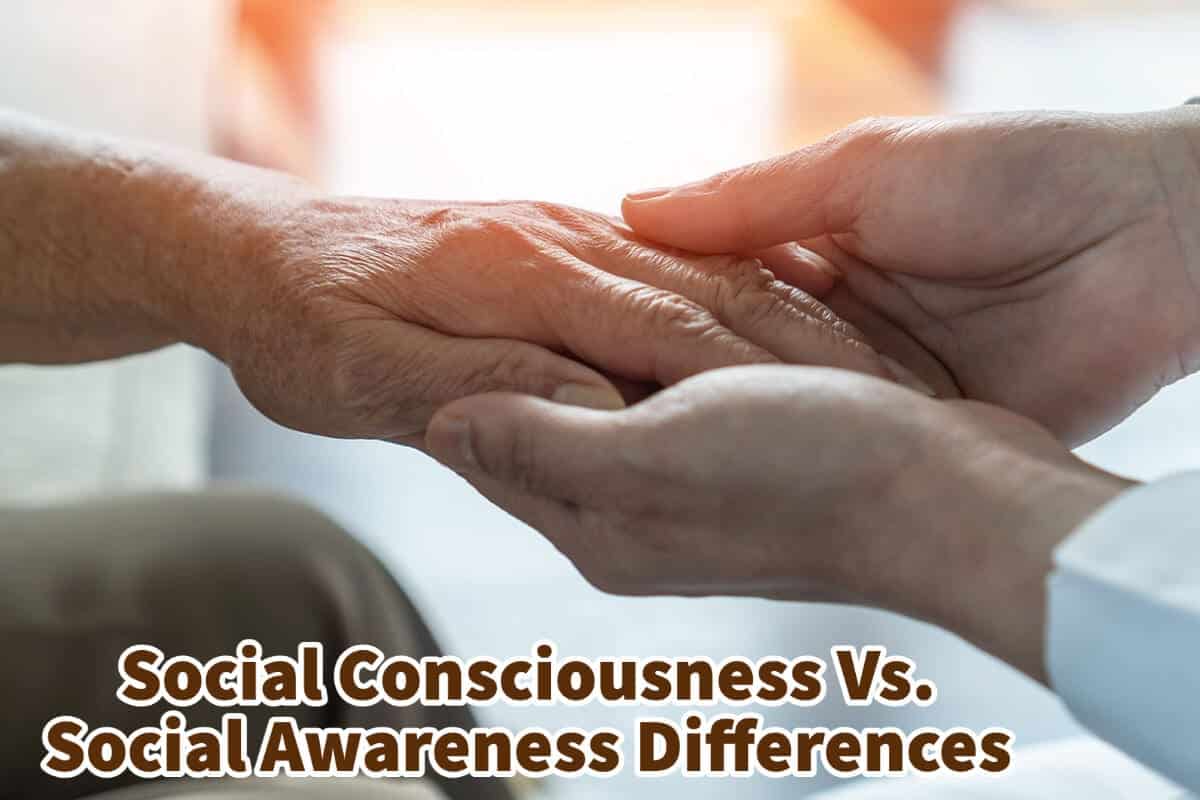At Mondoro, we deeply value social consciousness, recognizing its importance in understanding and addressing societal issues. Yet, we also emphasize the significance of being socially aware, ensuring that we are attuned to the immediate concerns and needs of the community around us.
While both social consciousness and social awareness hold pivotal roles in understanding societal nuances, it’s crucial to note that they are not identical. Despite their apparent similarities, they possess distinct characteristics. Let’s delve into defining each of these concepts and subsequently explore their differences.
Table of Contents
- Social Consciousness Vs. Social Awareness: Exploring The Distinct Differences
- 10 Key Differences Between Social Consciousness And Social Awareness
- Related Content
Social Consciousness Vs. Social Awareness: Exploring The Distinct Differences
The modern age has seen an increase in the emphasis on social issues, leading to the rise of terms such as “social consciousness” and “social awareness.” Both terms, often used interchangeably, offer profound insights into our understanding and interaction with societal concerns. However, they are distinct in their scope and implications.
Read on as we dive deep into the nuances of each term and illustrate ten ways they differ from one another.
Defining Social Consciousness
Social consciousness refers to the personal awakening or realization one experiences about broader societal problems. It’s a deeper, intrinsic understanding of systemic issues and injustices which encourages individuals to actively participate in bringing about change.

Social consciousness involves introspection, which shapes one’s attitudes, beliefs, and actions toward addressing societal challenges.
Defining Social Awareness
Social awareness, conversely, pertains to the recognition of social problems and the feelings, needs, and concerns of others. It’s an external perspective focusing on observing and acknowledging societal issues.

This awareness often serves as the first step toward social change, as it ignites interest in the more significant problems facing a community, nation, or world.
10 Key Differences Between Social Consciousness And Social Awareness
We’ve meticulously outlined the 10 primary distinctions differentiating social consciousness from social awareness, offering a comprehensive understanding of each concept.
Now, let’s differentiate the two through ten key differences.
Intrinsic Vs. Extrinsic Orientation
Social consciousness is an internal awakening from personal experiences, education, or introspection. It’s about aligning one’s core beliefs with societal change.
Social awareness is more about external recognition, often triggered by external factors such as media, discussions, or direct observations.
Depth Of Understanding
While social awareness often rests on the surface level—understanding that an issue exists—social consciousness delves deeper, seeking to grasp the root causes, implications, and interconnectedness of social problems.
Active Vs. Passive Stance
Social consciousness typically drives people to take active steps toward change through advocacy, volunteering, or other forms of action. Social awareness, while essential, might result in a more passive recognition without immediate action.
Emotional Engagement
Those with high social consciousness often experience a deeper emotional connection to issues, feeling empathy and a sense of responsibility. In contrast, social awareness might involve sympathy—pity or sorrow for someone else’s misfortune—without the deep-rooted emotional investment.
Duration And Persistence
Social consciousness is a long-term, ingrained perspective that persists even when an issue isn’t at the forefront of societal discussion. Social awareness might be more fleeting, fluctuating based on current events or trending topics.
Scope Of Impact
Social awareness generally relates to recognizing problems and discussing them. Social consciousness extends beyond mere recognition; it involves an ongoing commitment to effecting change on an individual and community level.

Motivation For Change
Social consciousness often drives people to seek systemic change, looking to shift societal structures and norms. Those with high social awareness might support change but might not always engage in transforming systemic foundations.
Learning And Adaptability
Social consciousness involves continuous learning, adapting, and evolving as new information or perspectives emerge. Social awareness might not always involve this adaptability; one might be aware of an issue without continually seeking to deepen their understanding.
The Interconnectedness Of Issues
Someone with a heightened social consciousness perceives the interconnectedness of social problems, understanding, for example, how environmental issues might relate to social injustices. Social awareness might recognize these issues individually but not always see the broader interconnections.

Individual Vs. Collective Perspective
Social consciousness often emphasizes the collective, promoting actions that benefit the community. While recognizing societal issues, social awareness might not always focus on the collective, sometimes emphasizing individual struggles or stories.
While social consciousness and social awareness are vital for a just and progressive society, understanding their distinctions helps individuals and communities address societal problems more effectively.
Awareness is the first step; it’s the light that highlights issues. Consciousness is the journey and the action, driving individuals to delve deep into issues and work towards solutions.
As society grapples with myriad challenges, fostering awareness and consciousness will be vital to creating a more equitable and just world.
At Mondoro, we believe having a social conscience is an essential part of any business; having a social conscience is part of our core values. We believe you can do business while still doing good.
Find out more about how Mondoro can help you create, develop, and manufacture excellent home decor and furniture products – don’t hesitate to contact me, Anita. Check out my email by clicking here or become a part of our community and join our newsletter by clicking here.
Mondoro gives out a FREE Lookbook to anyone interested. You can receive a copy of our latest Lookbook by clicking here.
Listen to our Podcast called Mondoro Company Limited. You can find it on all major podcast platforms. Try out to listen to one of our podcasts by clicking here.
Subscribe to our Mondoro Company Limited YouTube Channel filled with great videos and information by clicking here.
Related Content
Social Conscience Definition, What It Means
Having a social conscience is about being concerned about society’s problems or injustices or simply caring about those less fortunate. Many worldwide suffer from extreme poverty by living on less than 1.9 USD per day.
You can discover more by reading Social Conscience Definition, What It Means by clicking here.
How Social Environmental Responsibility Helps Fight Poverty
Social Environmental responsibility is about a company having social responsibility while also being concerned about its environmental impact. A Social Environmental Responsible company will look at profits and benefit society while being responsible towards the environment.
To find out more about How Social Environmental Responsibility Helps Fight Poverty by clicking this link.
What Is Social Consciousness? 7 Reasons It Is Important
Social consciousness is about being aware of the problems and injustices of society and then trying to do something about them. It is about leading with moral and ethical leadership and looking to do good. A company with a social conscience believes in human dignity while also considering the health of the planet.
You can discover more by reading What Is Social Consciousness? 7 Reasons It Is Important by clicking here.

